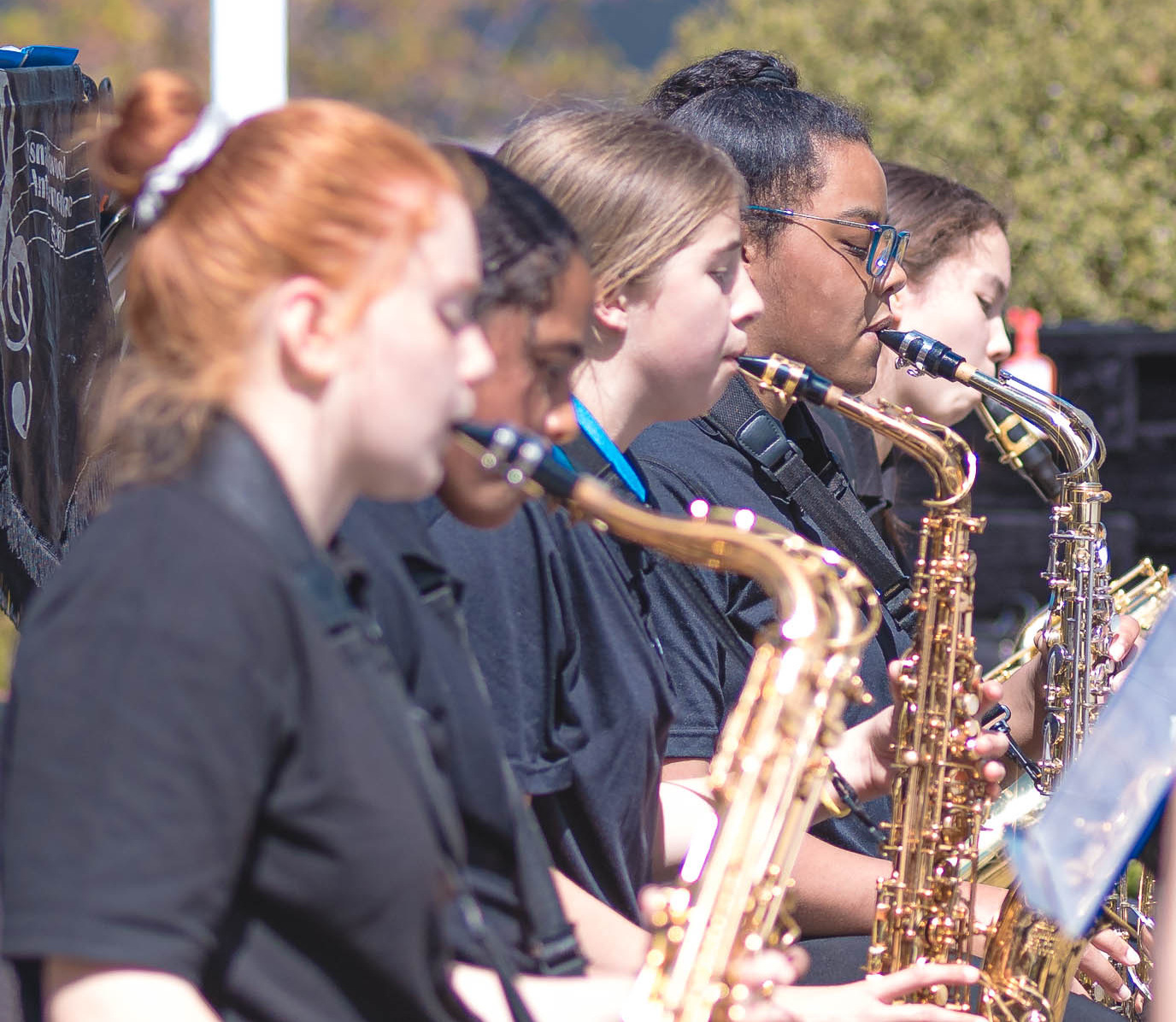A new year, a new band, new players and the experienced players have all moved on!
It’s only March, and you’ve been asked if the jazz band will play for the opening of an event.
The problem is that some of my new players only know a couple of notes as they only just started their first lessons. We’ve only started two charts.
Do you say – sorry we won’t be ready until at least next term? Do you say – sure, any performance is a good opportunity. Do you say – Yes, we can make that happen successfully!
POSSIBLE CONSEQUENCES
“Sorry, we won’t be ready until at least next term.”
I’ve seen this lead to, “We’re still not ready, they can just do a small in-school performance. I don’t want them to be shamed compared to other schools’ groups”. The group can end up with very few performances and low self-esteem or frustration among players who want to be given chances to grow more in their music performance experience and ability.
“Sure, any performance is a good opportunity.”
There’s a risk of it being a negative experience because the band wasn’t ready. Perhaps some students lose pride and motivation in being in the “not-yet-ready” group, or even lose interest in playing music in general after they see the video of the performance a parent took. Perhaps the organisers of the event decide not to ask your school group to perform again, not realising the potential they have. Of course, there will be some students and parents who love the experience regardless of how the performance sounds.
“Yes, we can make that happen successfully!”
A few years ago, when we were asked to perform in March for a big public event, we trialled a new model for our jazz band that has become a very successful tradition. We invited our previous year’s band to do the gig – we called it a “reunion gig”. Meanwhile, we prepared our new band to learn as much as feasible of one or two of last year’s easier repertoire, and
I concentrated on teaching our new band one new easy piece (albeit with some parts missing etc).
For us, being an intermediate school, there’s usually between one and eight Year 8 second-year players who know the previous year’s repertoire. It’s always tricky for them at the start of each year because suddenly the band they got used
to playing with are half complete beginners, which can feel discouraging. So, knowing they will get to play with last year’s band in term one is something they look forward to a lot! As for the new players, the rules are simple. Always play the last note. Or at least hold your instrument as though you are playing it (if you forget how to play that note suddenly). Follow through and always navigate their music part, play the notes they can, and enjoy the sensation of the band for the other bars. This
is hugely important because the students get the feeling and sound of what their new band is aiming for and what it will sound like. They are dressed in uniform and a real part of the performance.
Each year is obviously a bit different, usually with double-ups of horns and double-ups or swap-arounds within the rhythm section. Often everyone (including the newbies) plays a
short 2-bar solo within a piece, which normalises this aspect of being in a band (even if just on two notes). If we have managed to mostly learn one new chart, it creates a good challenge and freshness for the old band to learn and play with the new band. We have also done an early-in-the-year gig by jumping into a community big band gig and playing a couple of charts with a friendly adult band. The value to the students and entertainment for the families/audience is huge, and it
is highly motivating for the new band. The bar is set, and the new students rise to it quickly over the next few weeks. It is great to see the pride in the performance and group and the motivation and commitment this gives.
Our school year for jazz bands now ends in March or April of the following year, and it has become a wonderful and valuable tradition. Admittedly this year’s term one was very tricky with rehearsals needing to be in four different rooms connected via video link due to Covid restrictions and much illness in term two. Still, we did squeeze in a couple of successful combined performances in May!
GIGS AND TOURS
Students will quickly learn commitment, teamwork, and professional standards of behaviour if they are given opportunities to play in public, especially doing a tour later in the year. Our first combined gig of the year is usually as part of a community outdoor event. Gigs also give students deadlines to learn music and the chance to experience different contexts and audiences. Try a band camp (or band day!) that includes a performance.
Tours can pack multiple experiences into a short time. Tours we have enjoyed (later in the year) include going to festivals such as the MusicWorks National Ensemble Festival Aotearoa musicworks.co.nz/mefa-home/ (formerly WeBO), performing at local schools or schools in another region, going around several local Early Childhood Centres over a couple of days (with interactive educational aspects!), and even performing at non-music festivals such as the Oamaru Steampunk festival. Performances at lifestyle/retirement villages later in the year include repertoire that the audience will know.
OTHER TIPS TO MAKE THAT FIRST PERFORMANCE A HIT:
• Choose repertoire that matches the students’ current abilities. For example – if you have strong singers, make sure you have repertoire that features them in the right key for their voice.
• Choose repertoire that your bass player can at least play the first note of every bar and every chord change correctly.
• Choose repertoire that at least someone in the band can play the head for! I always include a 12-bar blues chart so students get used to the form, sound, and changes.
• Teach tuning and intonation from the very beginning, so it’s normal to respond to and correct.
• Importantly have fun, and as the band director, respond to all the good moments in the music immediately!
CHRISTCHURCH BIG BAND FESTIVAL
The Christchurch Big Band festival is an opportunity during the October Labour Weekend for any Big Band (from professional to beginner bands) to participate in a full weekend of Big Band performances, workshops and more. It is in its 16th year and runs annually in Christchurch. If you have a jazz big band of any age, the event provides lots of opportunities to see what others are doing, share ideas and perform.
BAND DIRECTORS COURSE
Check out the NZ Jazz Foundation website, where jazz director workshops are advertised and run by Rodger Fox and Dave Lisik alongside student workshops. It is being run from Dec 11-16, 2022, in Wellington.
Words by Judith Bell.

BIO: Judith (Mus B hons, LAIRMT) is the Jazz Programme director at Chisnallwood Intermediate and a jazz director at Shirley Boys High. She was music HOD at Chisnallwood for 23 years running multiple performance groups and music technology. She is co-chair of Music Education Canterbury, co-music director of “Strum Strike and Blow”, and is on the organising committee for the Christchurch Big Band Festival. She plays in two Big Bands.
